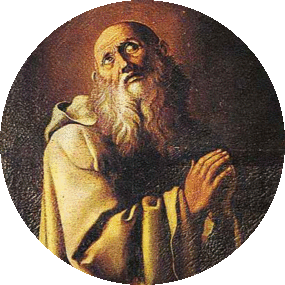
19 June
Memorial
St Romuald (950-1027)
Abbot and Founder
Born: 950 at Ravenna, Italy
Died: 19 June 1027 at Val-di-Castro, Italy
Canonized: 1582 by Pope Gregory XIII
St. Romuald was born in Ravenna of a noble family. Founder of the Camaldolese monks — one of the Italian branches of the Benedictines — in which the eremitical life is combined with life in community. He died in 1027, after a life of prayer and rigorous penance. In the Extraordinary Form his feast is celebrated on February 9.
COLLECT PRAYER
O God, who through Saint Romuald renewed the manner of life of hermits in your Church, grant that, denying ourselves and following Christ, we may merit to reach the heavenly realms on high. Through our Lord Jesus Christ, your Son, who lives and reigns with you in the unity of the Holy Spirit, God, for ever and ever.
Things to Do:
- Read more about St. Romuald here.
- Spend some time reading the Psalms in silence as St. Romuald taught. “Sit in your cell as in paradise. Put the whole world behind you and forget it. Watch your thoughts like a good fisherman watching for fish. The path you must follow is in the Psalms—never leave it.”
The Rules of the Order, written by St. Romuald, states:
“Be seated within your cell as though in paradise; cast to the rear of your memory everything distracting, becoming alert and focused on your thoughts as a good fisherman is on the fish. One pathway to this state is through reciting the Psalms; do not neglect this. If you cannot manage to get through them all at one sitting as you used to do with the fervor of a novice, take pains to chant the psalms in your spirit, now starting from this place, now from that, and to interpret them in your mind, and when you begin to wander in your reading, don’t stop what you are doing, but make haste to correct by interpreting; place yourself above all in the presence of God with fear and trembling, like one who stands in the gaze of the emperor; pull yourself completely and crouch down like a baby chick, content with God’s gift, for, unless its mother provides, it neither knows nor gets what she should eat.”
Saint Romuald
St. Romuald, the founder of the Camaldolese Order, could not decide for a considerable time whether to serve God in a religious life or to remain in the world. After his father killed a relative in a duel at which Romuald was forced to be present, he went to the monastery of St. Apollinaris, near Ravenna, and did penance for forty days. Later, he entered this same monastery as a monk. Then he became a follower of the hermit Marinus in Venice. In the course of time he founded an order of hermits which received its name after the most famous of his foundations, Camalduli in Tuscany.
Romuald’s was one of the strictest orders for men in the West (a branch of the Benedictine Order). Members live isolated in small huts, observing strict silence and perpetual fasting, constantly praying or engaged in manual labor. Our saint enjoyed the grace of bringing sinners, particularly those of rank and power, back to God. When he died, he was a little over seventy years; he had never used a bed, had always sought out ways of practicing severe penances. 15 years later his pupil, the holy doctor of the Church, St. Peter Damian, wrote his biography.
“His greatness lies in the rigorous and austere character of his interpretation of monastic life-an approach that was quite singular and unique. In the deepest recesses of his being, Romuald was an ascetic, a monk; not perhaps, a monk of that serene peace and self-possession exemplified by St. Benedict in his life and described by him in his Rule. Nor was Romuald an organizer who through prudent legislation enabled his spirit to flourish and affect great numbers. He reminds us of the stolid figures inhabiting the Eastern deserts, men who by most rigorous mortification and severest self-inflicted penances gave a wanton world a living example of recollection and contemplation. Their very lives constituted the most powerful sermon. It is in company with men like these that St. Romuald continues to live.”
Romuald was not at all a fluent reader. Whenever he made another of his many mistakes, Marinus, his teacher, beat him on his left cheek. Finally it became too much for Romuald.
“But, dear master,” he said modestly, “hit me on the right cheek in the future. My left ear is almost deaf.” The master was surprised at such patience and thereafter acted more considerately.
The saint loved to say,
“Better to pray one psalm with devotion and compunction than a hundred with distraction.”
When the holy man felt his end was near, he retired to the monastery at Val di Castro. After so many journeys he was eager to begin his final pilgrimage to an eternal resting place. Before the reform of the Calendar in 1969 his feast was celebrated on February 7, the anniversary of the translation of his relics in 1481. His feast is now June 19, the day he died in 1027. In the Calendar reform the Church has tried to move the feasts of the saints to their “birthday” — referring to the day on which the saint died and celebrated his/her birth into heaven.